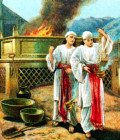- Leviticus 10:1-3
 We have this brief narrative, in which Moses tells of us two of the sons of Aaron, the newly-appointed high priest," offering "unauthorized fire" (KJV, "strange fire") on the altar of the Lord. This may mean that, where they had been commanded to keep a continuous fire on the altar, they instead began their work with a newly-kindled flame. Or, as in Keil and Delitzsch, this may refer to an unscheduled time or in an improper place. The text here doesn't explain the reference, presumably because it was written by Moses at the time, or soon after, so the details would have been publicly known.
We have this brief narrative, in which Moses tells of us two of the sons of Aaron, the newly-appointed high priest," offering "unauthorized fire" (KJV, "strange fire") on the altar of the Lord. This may mean that, where they had been commanded to keep a continuous fire on the altar, they instead began their work with a newly-kindled flame. Or, as in Keil and Delitzsch, this may refer to an unscheduled time or in an improper place. The text here doesn't explain the reference, presumably because it was written by Moses at the time, or soon after, so the details would have been publicly known.The Lord's response is surprising. He doesn't ask simply, "Why didn't you do things the way I told you?" Rather, He rebukes it as an affront to His holiness.
We see a similar rebuke, also to the priests, in Malachi 1:6, "'A son honors his father, and a servant his master. If then I am a father, where is My honor? And if I am a master, where is My fear?' says the LORD of hosts to you, O priests, who despise My name. But you say, ‘How have we despised Your name?’" There, the priests feign ignorance of their sins: "How have we despised Your name?" they ask.
Manmade worship, labeled theologically as "will-worship," is an affront to God's holiness because it places His worship at the whim of fallen, sinful man. It brings His worship down to our level, rather than up to His. It treats His worship like actual manmade worship of pagan deities. It is no longer worship but abuse. John Calvin (II.8.17), describes it as, "the licentious daring which would subject the incomprehensible God to our senses..." This principle is known in Reformed theology as "the regulative principle of worship" (hereafter "RPW"). It is often phrased as, "Whatever is not commanded is forbidden."
This contrasts with the Lutheran concept, which holds that, "Whatever is not forbidden is permitted." These Protestant views I consider to be consistent with Paul's admonition in I Corinthians 1:40, that "all things should be done decently and in order." And, of course, it contrasts with Catholicism, which holds that the Pope is the Vicar of Christ, and can therefore create whatever he wants in God's name.
The RPW is prominent in Reformed confessional tradition. In the Second Helvetic Confession, the confessional standard of the Swiss and Hungarian Reformed churches, Chapter V, we read, "[W]e teach that God is to be adored and worshiped as He Himself has taught us to worship, namely, 'in spirit and in truth' (John 4:23 f.), not with any superstition, but with sincerity, according to His Word; lest at anytime He should say to us: 'Who has required these things from your hands?' (Isa. 1:12; Jer. 6:20). For Paul also says: 'God is not served by human hands, as though he needed anything,' etc. (Acts 17:25)." And in the Westminster Confession, the confessional standard of Reformed churches in the Scottish tradition, usually titled "Presbyterian," XXI:1, we read, "[T]he acceptable way of worshiping the true God is instituted by Himself, and so limited by His own revealed will, that He may not be worshiped according to the imaginations and devices of men, or the suggestions of Satan, under any visible representation or any other way not prescribed in the holy Scripture."
This narrative in Leviticus is a case-law application of the Second Commandment. The fact that God puts His worship in such a prominent place in His Law indicates how important it is in His estimation, regardless of how lackadaisically we treat it. That is why I personally could never, in good conscience, be a member of any but a Reformed church. That is not to say that I think that only the Reformed are Christians. In fact, if my family attended an orthodox Lutheran church, where now they attend none, I would bless God, and not quibble. But in my own actions, my conscience is more thoroughly trained, and I would not make that choice for myself.



